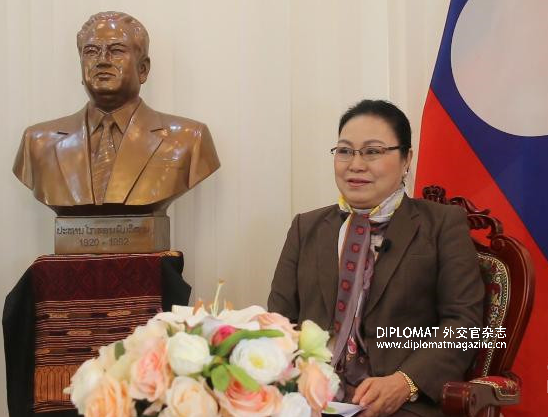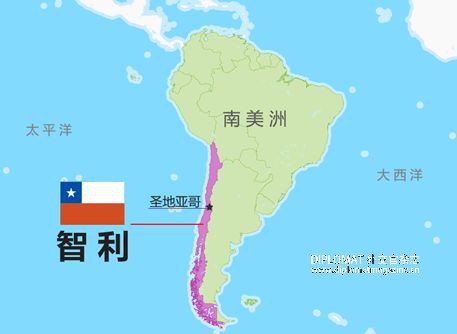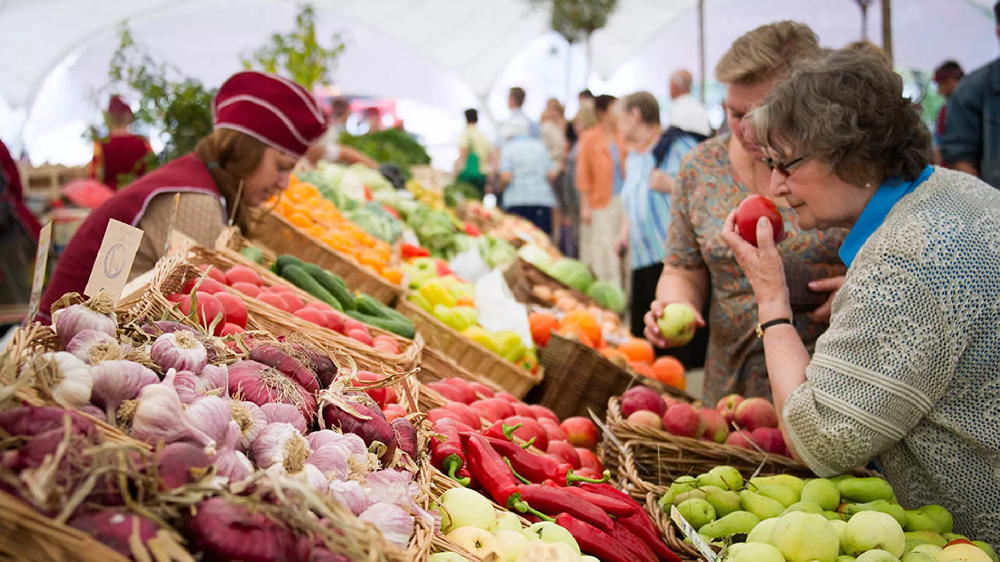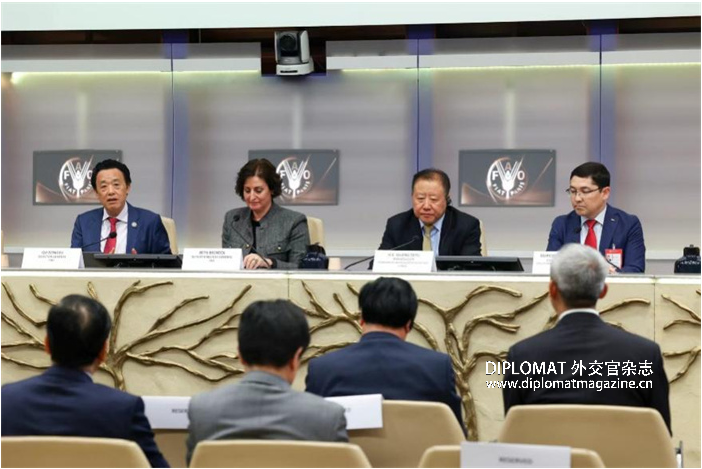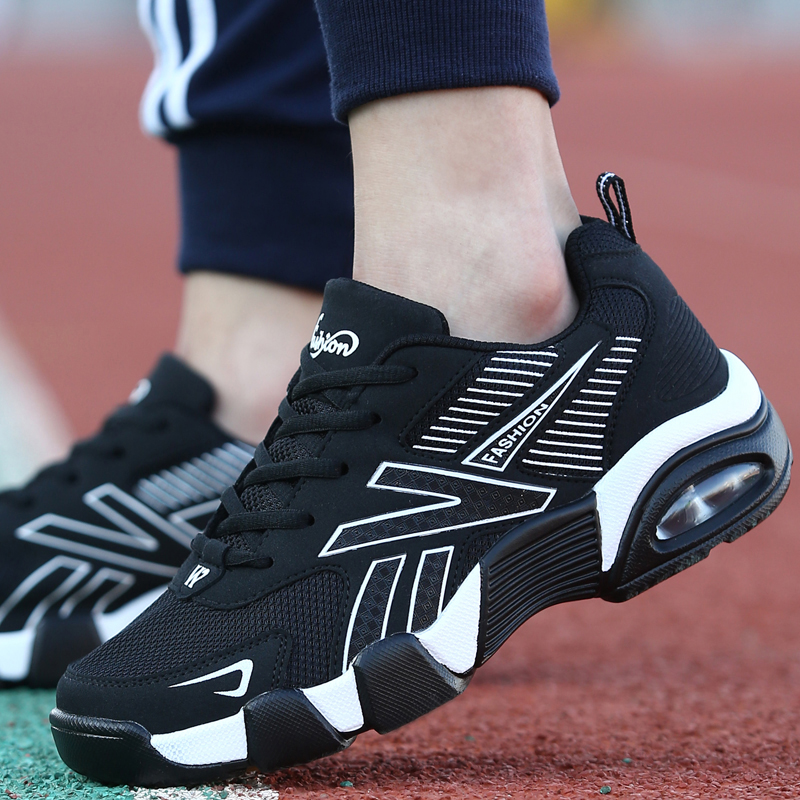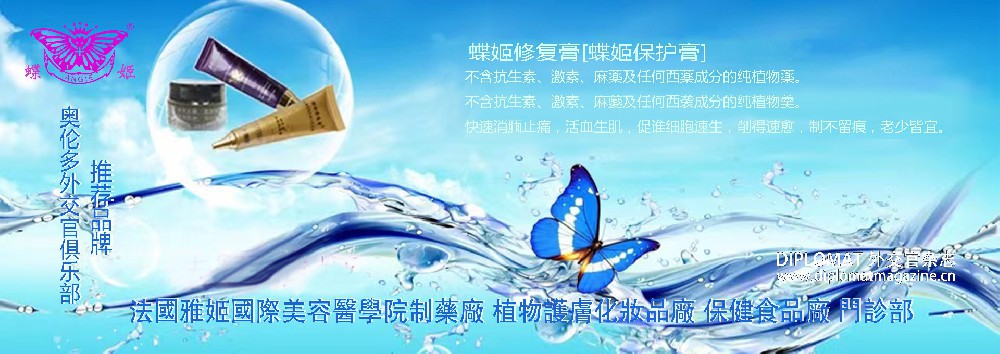导语:Trade and Economic CooperationUzbekistan’s trade turnover with EU countries from 2017 to 2024 increased 2.4 times from $2.6 billion to $6.4 billion, exports increased 3.6 times from $472.3 million to $1.7 billion, imports increased 2.2 times from $2.2 billion to $4.7 billion. During the period 2017
In the lead-up to the “Central Asia – European Union” Summit, which will take place on April 3–4, 2025, in Samarkand, the Center for Economic Research and Reforms (CERR) has prepared an infographic reflecting the dynamics of Uzbekistan’s foreign trade and investment cooperation with the European Union countries over the past 7 years.
Trade and Economic Cooperation
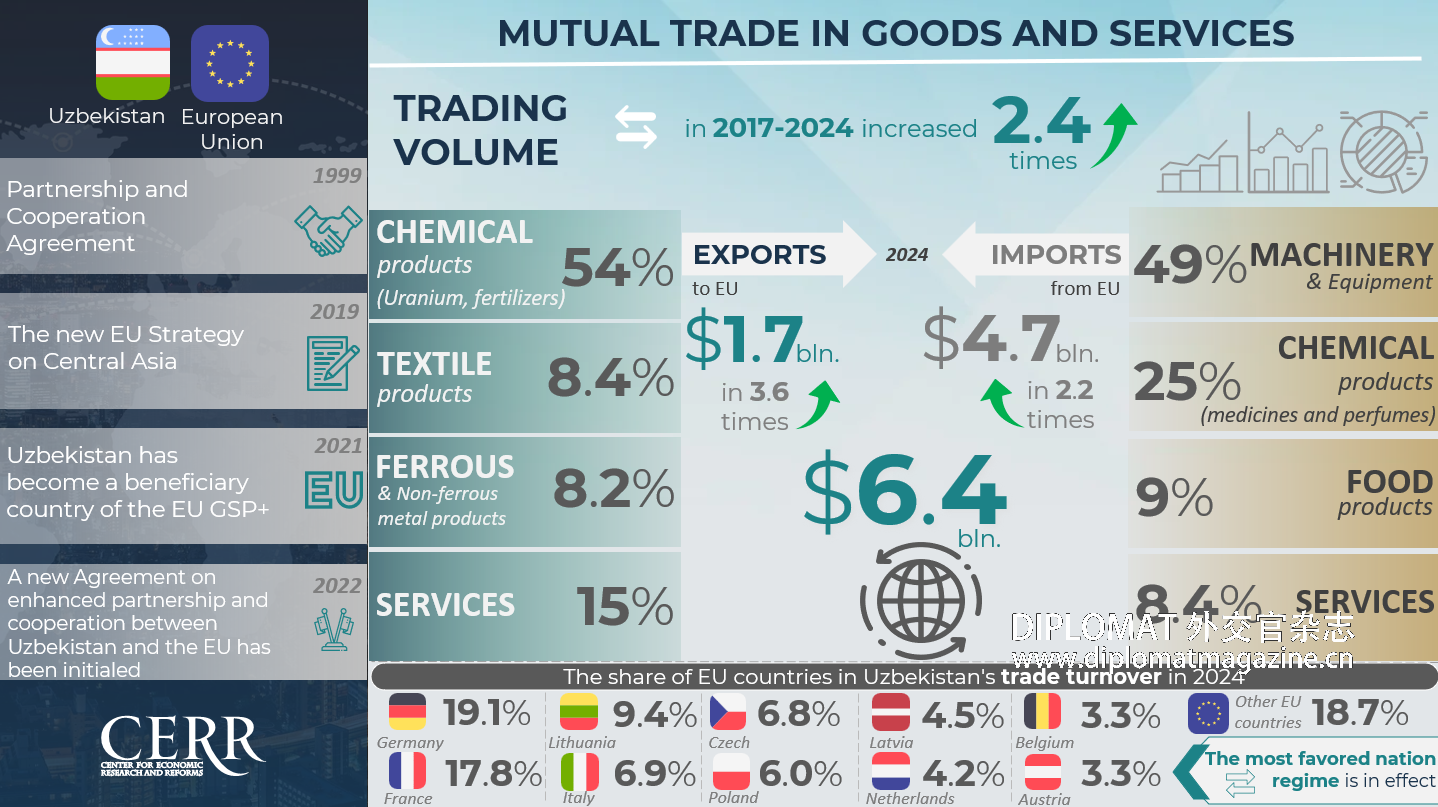
Uzbekistan’s trade turnover with EU countries from 2017 to 2024 increased 2.4 times from $2.6 billion to $6.4 billion, exports increased 3.6 times from $472.3 million to $1.7 billion, imports increased 2.2 times from $2.2 billion to $4.7 billion. During the period 2017–2024, the share of EU countries in Uzbekistan’s total trade turnover slightly decreased from 9.9% to 9.7%, in total exports it increased from 3.8% to 6.3%, and in total imports it decreased from 15.5% to 12%. The decrease in the EU share in Uzbekistan’s total imports occurred due to a reorientation of part of Uzbekistan’s imports from EU countries to Asian countries. At the same time, the volume of exports to EU countries and its share in Uzbekistan’s total exports increased.
In 2024 compared to 2023, Uzbekistan’s trade turnover with the EU increased by 5.2% from $6.1 billion to $6.4 billion, exports increased by 26.9% from $1.3 billion to $1.7 billion, imports remained unchanged at $4.7 billion.
In 2024, Uzbekistan’s exports to EU countries amounted to $1.7 billion. The main volume (54%) was chemical products – $877.4 million, including radioactive elements (uranium) – $775.3 million, fertilizers – $95.6 million, various sulfates and carbonates – $2.5 million. In 2024, 86% of all uranium exports, about 27% of fertilizer exports, 5% of textile products and 2.1% of fruit and vegetable products were supplied to EU countries.
In 2024, Uzbekistan’s imports from EU countries amounted to $4.7 billion. EU countries are among the main suppliers to Uzbekistan of “machinery, equipment and transport vehicles,” chemical and other industrial products necessary for development. In 2024, about 50% ($2.3 billion) of Uzbekistan’s imports from EU countries consisted of “machinery, equipment, transport vehicles, electrical goods, instruments and medical equipment,” including aircraft (10 units) worth $272.4 million from Germany, France, the Czech Republic and Slovakia.
The second major import category from EU countries is chemical products (pharmaceuticals, perfumery, cosmetics and other chemical substances) – $1.2 billion (24.9% of imports). EU countries account for about 16% of Uzbekistan’s total imports of “machinery, equipment and transport vehicles,” including almost all imported civil aircraft, as well as 40% of total pharmaceutical imports.
In 2024, the main share of Uzbekistan’s trade turnover with EU countries was with: Germany (19.1%), France (17.8%), Lithuania (9.4%), Italy (6.9%), Czech Republic (6.8%), Poland (6%), Latvia (4.5%), the Netherlands (4.2%), Belgium (3.3%), Austria (3.3%), Slovenia (2.8%) and others.
Investment Cooperation
In 2024, the volume of foreign direct investment and loans from EU countries (including financial institutions of EU countries) increased by 77% and amounted to $4.1 billion (in 2023 – $2.3 billion). At the same time, in 2024 compared to 2017, the annual volume of attracted investments from EU countries increased 18 times (in 2017 – $222 million, in 2018 – $324.1 million).
The largest volume of investment in 2024 was attracted from Germany – $1.4 billion, the Netherlands – $1.1 billion, Cyprus – $858.9 million, the Czech Republic – $137.8 million, Italy – $99.8 million, Sweden – $97.5 million, and others. For the period 2017–2024, the total volume of attracted direct investments and loans from EU countries (including from EU financial institutions) amounted to $12.4 billion.
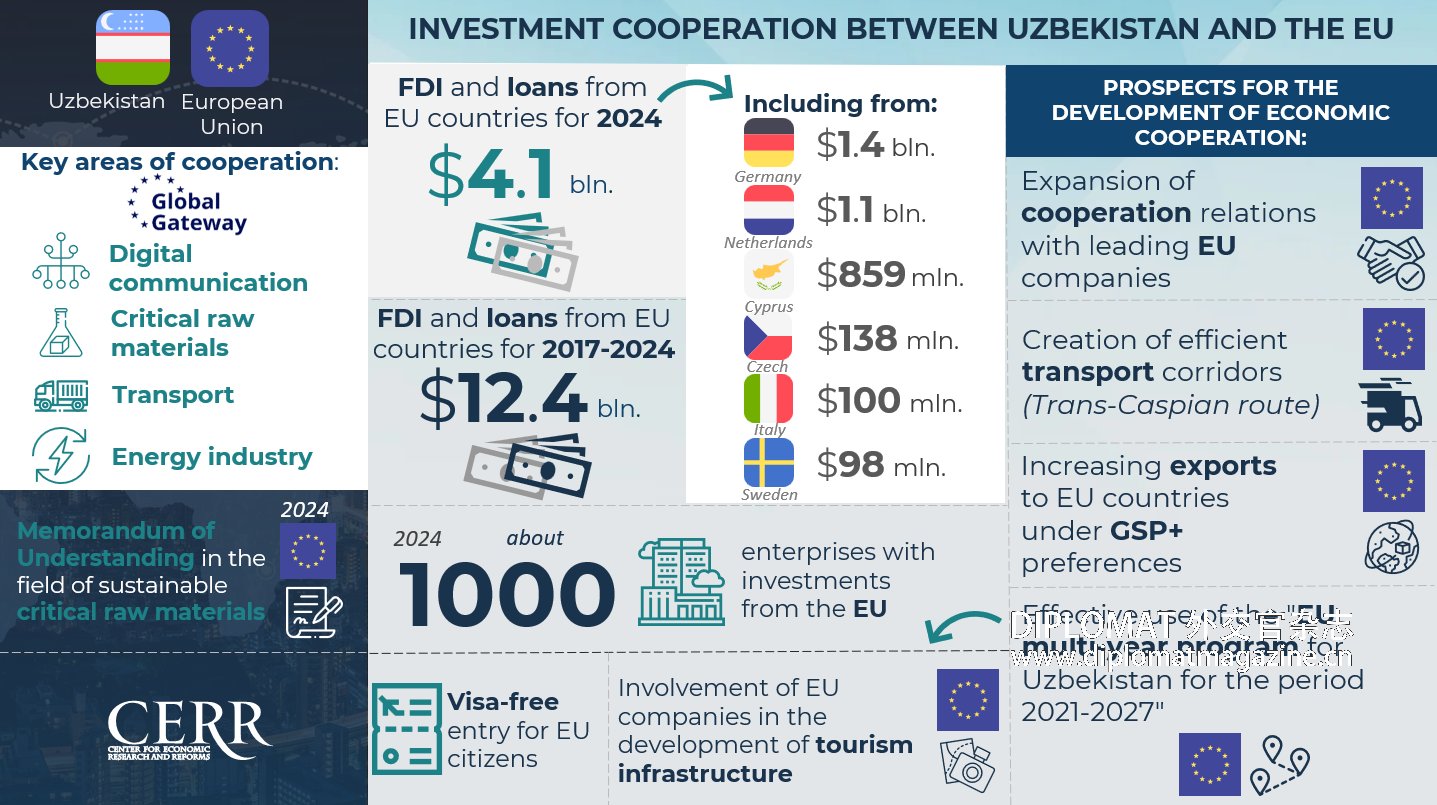
About one thousand enterprises with capital from EU countries operate in Uzbekistan, including 201 with German capital.
Conclusion
The development of economic cooperation between Uzbekistan and EU countries has significant potential and opens up broad opportunities for mutually beneficial partnership. Uzbekistan is interested in attracting European investments and advanced technologies in strategically important sectors such as renewable energy, the chemical and pharmaceutical industries, agriculture and transport logistics.
At the same time, European companies gain the opportunity to expand their presence in promising new markets in Central Asia, strengthening their positions in global production chains. Equally important is the active use of the GSP+ beneficiary status granted to Uzbekistan to increase exports of high-quality agricultural and textile products to European markets. Further technical assistance from the EU in certification, digital transformation and WTO accession will enhance the competitiveness of Uzbek goods and services, which in turn will strengthen bilateral trade and economic ties. The entry into force of the new Enhanced Partnership and Cooperation Agreement between Uzbekistan and the EU, as well as the effective use of European financial support programs, could become an important incentive for the sustainable development of Uzbekistan’s economy.
Promising areas also include joint projects in the field of tourism infrastructure, taking into account the preferences of European tourists, which will ensure growth in tourist flows and contribute to the strengthening of intercultural ties between the parties.
Overall, the upcoming summit in Samarkand may become not only a symbolic but also a practically significant step toward a new level of cooperation, based on pragmatism, mutual benefit and a shared commitment to sustainable development.
Public Relations Sector
Center for Economic Research and Reforms



